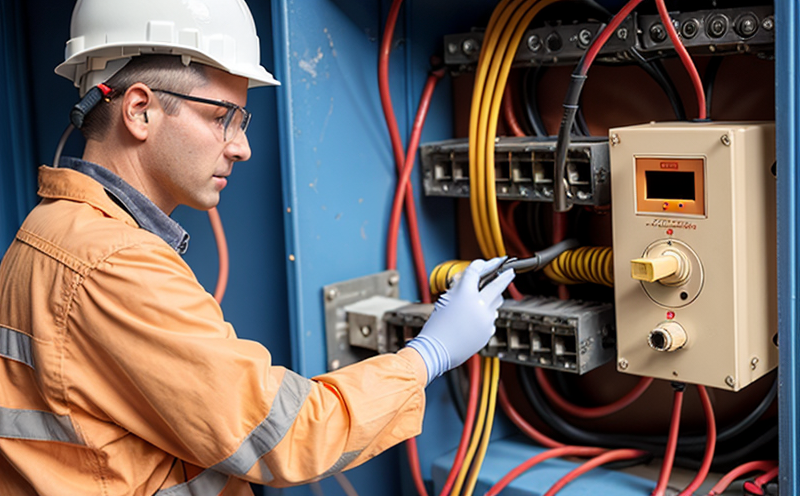IEC 61215 Electrical Safety Testing for Photovoltaic Devices
The IEC (International Electrotechnical Commission) standard 61215 is a critical benchmark for ensuring the safety and reliability of photovoltaic devices. This standard mandates rigorous testing to evaluate the electrical safety, mechanical robustness, and overall performance of PV modules. Compliance with this standard is mandatory for manufacturers aiming to secure market access in Europe and other regions that recognize IEC standards.
The primary focus of IEC 61215 lies in ensuring that photovoltaic devices can withstand harsh environmental conditions without compromising their structural integrity or electrical safety. This ensures not only the longevity and reliability of the devices but also the protection of users from potential hazards. The standard is particularly relevant for solar panel manufacturers, installers, and quality assurance teams looking to ensure regulatory compliance.
The testing protocol outlined in IEC 61215 covers a wide range of parameters that are critical to the electrical safety of photovoltaic devices. These include insulation resistance tests, leakage current measurements, and high voltage endurance assessments. The standard emphasizes the importance of these tests in preventing fires, electric shocks, and other hazards associated with improper electrical connections or faulty insulation.
In this testing process, specimens undergo a series of rigorous procedures designed to simulate real-world conditions. For instance, PV modules are subjected to both AC and DC voltages during high voltage endurance tests, which assess their ability to withstand transient power surges without damage. Leakage current measurements evaluate the risk of electrical shock by ensuring that the current flowing through insulation does not exceed safe thresholds.
The testing apparatus used in compliance with IEC 61215 is sophisticated and tailored to meet the stringent requirements set forth by the standard. The equipment includes high voltage generators capable of producing controlled surges, precision ammeters for measuring leakage currents, and specialized insulation testers. These instruments are essential for accurately assessing the electrical safety of photovoltaic devices.
The acceptance criteria specified in IEC 61215 provide a clear framework against which test results must be evaluated. A module passes the test if it meets all prescribed limits set by the standard, including insulation resistance values and permissible leakage currents. Failure to meet these criteria could lead to rejection of the product or further testing to address identified issues.
Photovoltaic devices that pass IEC 61215 are not only safer but also more reliable in real-world applications. This is particularly important for large-scale solar installations where any failure could have significant financial and environmental implications. By adhering to this standard, manufacturers can ensure their products meet the highest safety standards, thereby gaining a competitive edge in the market.
The impact of IEC 61215 extends beyond mere compliance; it also fosters innovation by encouraging manufacturers to develop safer and more robust photovoltaic devices. As technology evolves, so too must testing methodologies, and IEC 61215 provides a flexible framework that can accommodate these advancements.
In conclusion, the stringent electrical safety testing outlined in IEC 61215 is essential for ensuring the long-term performance and reliability of photovoltaic devices. By adhering to this standard, manufacturers can produce safe and reliable products that meet regulatory requirements and market demand.
Applied Standards
| Standard | Description |
|---|---|
| IEC 61215-1:2016 | Photovoltaic devices - Module testing and qualification. Part 1: General requirements. |
| IEC 61215-2:2013 | Photovoltaic devices - Module testing and qualification. Part 2: Test methods for crystalline silicon (c-Si) modules. |
| IEC 61215-3:2019 | Photovoltaic devices - Module testing and qualification. Part 3: Test methods for thin-film modules. |
EuroLab offers unparalleled expertise in the field of photovoltaic device testing, ensuring that our clients meet the highest standards set by IEC 61215. Our team of highly qualified professionals is equipped with state-of-the-art facilities and advanced instrumentation to carry out comprehensive electrical safety evaluations.
One key advantage of working with EuroLab is our ability to provide a full spectrum of testing services, from initial setup through final certification. This holistic approach ensures that all aspects of the PV module are thoroughly evaluated, minimizing the risk of non-compliance or rejections.
We offer flexible testing schedules to accommodate even the most demanding project timelines, ensuring that your products can be brought to market on time and within budget. Our commitment to quality is reflected in our rigorous adherence to IEC 61215 standards, using only the latest technologies and methodologies.
Moreover, EuroLab's extensive experience allows us to offer valuable insights into best practices for PV module design and manufacturing. Our team can provide tailored recommendations based on test results, helping you optimize your products for maximum safety and reliability.
In summary, by choosing EuroLab for your IEC 61215 compliance testing needs, you gain access to a comprehensive suite of services delivered by industry experts with deep knowledge in photovoltaic device testing. Our unwavering dedication to quality ensures that your products meet or exceed the stringent requirements set forth by this critical standard.
Quality and Reliability Assurance
- Instrument Calibration: All instruments used for IEC 61215 testing are regularly calibrated to ensure accuracy and reliability.
- Data Security: We implement robust data management practices to protect sensitive information throughout the testing process.
- Expert Review: Each test result undergoes a thorough review by our team of certified engineers before final certification is issued.
- Continuous Improvement: EuroLab continuously updates its methodologies and procedures based on emerging standards and best practices in the industry.





